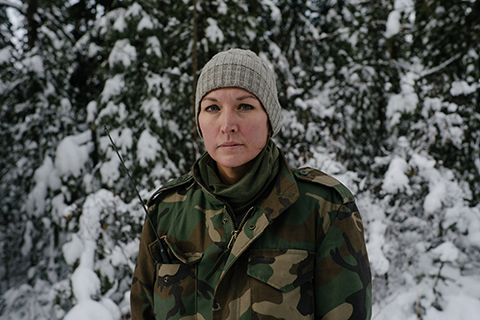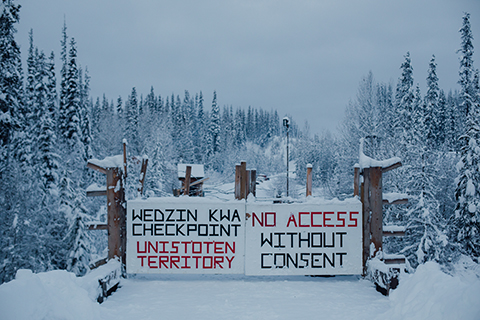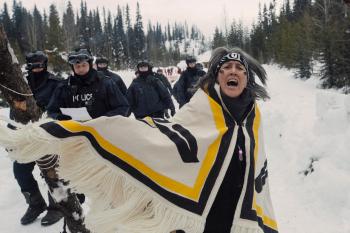Image Caption
Summary
Local Journalism Initiative Reporter
Windspeaker.com
Update:
On the heels of its World Premiere at the True/False Film Festival this month YINTAH, the story of the Wet’suwet’en people reoccupying their territory and resisting the construction of multiple pipelines, will have its Canadian Premiere in Toronto at the 31st edition of Hot Docs on Saturday, April 27 and Sunday, April 28. Directors Jennifer Wickham, Brenda Michell and Michael Toledano will be in attendance, alongside special guests Tsakë ze’ Howilhkat Freda Huson, Tsakë ze’ Sleydo’ Molly Wickham and Dinï ze' Dsta'hyl Adam Gagnon. Yintah | Hot Docs
Original Story:
Yintah is a new documentary film about environmental racism, injustice and the power of Indigenous resistance.
The film’s global debut will be March 1 at the True/False FilmFest in Columbia, Missouri. The Canadian debut and screenings will follow shortly thereafter, to be announced soon on the Yintah website here: https://www.yintahfilm.com/
Filmmaker Jennifer Wickham belongs to Cas Yikh (Grizzly Bear House) in the Gidimt’en (Bear/Wolf) Clan of the Wet’suwet’en. Twelve years ago, she moved to the Yintah (land) to defend her home territories against proposed pipelines.
As the media coordinator for Gidimt’en Checkpoint, a website devoted to the Wet’suwet’en hereditary chiefs’ struggle against pipelines and police incursion on the territory in northern B.C., she shares messages from the intersection of social justice and sovereignty.
“Our filmmaking process was ultimately designed to encourage collaboration and to support the collective authority of Wet'suwet'en people,” explained co-director and co-producer, journalist and award-winning filmmaker Michael Toledano.
For Wickham, filmmaking wasn't a career pivot, but rather an organic evolution from her role as media coordinator. While she has always been a visual thinker, she said she never envisioned herself navigating the complexities of the film industry. Receiving a decade's worth of footage chronicling Indigenous resistance and resilience sparked the documentary project.
That footage was shot by Toledano and a number of camera operators “who spent long stints of time living on Wet'suwet'en territory, including Melissa Cox, Dan Loan, Jesse Freeston, Sam Vinal, Keir Knight, Grace Burke, and Alexandra Kotcheff,” said Toledano.
“With 10 years of footage, obviously it's a massive endeavor,” Wickham said. “To get something down to a feature-length film, which is 90 minutes to two hours. We started having those conversations in the summer of 2020.”
Within a year, the team was landing contracts from broadcasters.
“One of the bigger fish being CBC, so the film will be broadcast on CBC this fall on The Passionate Eye.”
Yintah follows the activism of Tsakë ze’ Howilhkat (Freda Huson, wing chief of the Unist’ot’en people, Wet’suwet’en C’ilhts’ëkhyu clan) and Tsakë ze’ Sleydo’ (Molly Wickham, wing chief of the Cas Yikh people, Gidimt’en clan). The film shares an intimate view of Indigenous resurgence in the battle against pipelines.
In 2011, Howilhkat went to live directly in the path of a proposed pipeline corridor through Wet’suwet’en Yintah. There she and her supporters built a healing centre for Wet’suwet’en people.
Howilhkat’s become an international leader in the fight for Indigenous sovereignty and reclamation of their lands around the globe.
She has received international recognition as recipient of the Right Livelihood Award in 2021. Right Livelihood is an organization committed to peace, justice and sustainability for all. The award recognizes “courageous change-makers”, and Howilhkat as a social justice leader, advancing environmental causes. She has brought her advocacy to the United Nations presenting at the UN Permanent Forum on Indigenous Peoples in 2019.

For the past 10 years, Sleydo’ has lived on her clan’s unceded territory with her family, building a strategically placed cabin to protect a beautiful lake from mining.
As the Cas Yikh clan reoccupied their Yintah, Sleydo’ led a 55-day blockade of the Coastal GasLink pipeline, becoming the target of state harassment, as outlined in a report from the United Nations Committee on the Elimination of Racial Discrimination.
That report highlights “ongoing violations and abuses against Wet’suwet’en Indigenous Peoples and communities related to the development of the Coastal GasLink pipeline project, as well as the human rights violations of land rights defenders peacefully demonstrating against the Coastal GasLink (CGL) pipeline under construction that was approved in 2018 without the consent of the impacted Indigenous Peoples represented by the Wet’suwet’en Hereditary Chiefs.”
“The film has an observational or ‘fly on the wall’ style. We witness the events themselves, rather than a narrator explaining what happened,” explained Toledano. With limited voice overs or narration, information is shared through long-form interviews with Howilhkat and Sleydo’.
“There is definitely a delicate balance between showing the beauty of the Yintah and being real about the level of violence that the people and the land experience,” said Wickham.
The film also communicates a decade of change for Howilkhat as she ages as she builds the healing centre. The audience sees Sleydo’ becoming a mother of three children.
From the beginning, following cultural protocol in pulling the film together was key, said Wickham.
“We decided very early on that with our guiding principles of making the film, we would be consulting with, and taking direction from the house groups– Unist’ot’en for Howilhkat, and Cas Yikh for Sleydo’.”
“So we've been doing ongoing screenings with the house groups at every stage of the film, and doing consultation all throughout,” said Wickham. “Following Wet'suwet'en law, neither house group interferes with the other house group's business, so each house group has autonomy over shaping the story and how they want it to be told.”
In this way, direction and production were collaborative, with Wickham (Cas Yikh house) co-directing with Tsakẽ ze’ K-eltiy Brenda Michell (Unist’ot’en house) and Toledano. Wickham explains the creative process was very open-ended, following the cues from key moments in the footage.
Yintah invites viewers not only to bear witness to the struggle, but also to envision a world where Indigenous sovereignty reigns supreme.

Telling silenced stories
Central to Wickham’s creativity is believing that artists serve as conduits for social change, she said.
Wickham quotes something to Windspeaker that she had once read: “The role of the artist is the same as the role of the lover. And it's our job to show our loved ones things that they aren't seeing,” she said.
“I tried at one point to find a poem that I had written that wasn't political,” she laughed. “I was unsuccessful.”
“I think it's really critical, especially in times that we're seeing now in the world, to find ways to communicate with each other that the general public is receptive to. And I find that people have lower defenses when it comes to consuming art than they would if you’re yelling at them with a megaphone in the street,” Wickham said.
“So I think that there's definitely a role for artists in speaking up and telling the stories of people that are being silenced,” she said.
“Canadian police went to great lengths to silence this story,” Toledano said. “Journalists and filmmakers documenting this history have variously been blocked from accessing newsworthy events by expansive and unlawful police exclusion zones, subject to surveillance and harassment, detained, arrested, and held at gunpoint.”
Photojournalist Amber Bracken’s arrest in November 2021 while covering RCMP attempts to arrest the Wet’suwet’en land defenders is an example of such silencing.
“I was held in jail for four days after filming a police raid on Gidimt'en land,” said Toledano.
Wickham has also experienced that silencing in her life “seeing it in the people around me, and the people that I love, and my family.”
Preparing for the documentary’s world debut, Wickham is keeping her eyes on her goal of fostering dialogue, igniting consciousness, and nurturing solidarity, she said
The documentary intends to be a spark for social change through empowering and challenging viewers to confront uncomfortable truths, and mobilize for collective action to reclaim their cultural heritage and assert their rights and sovereignty, said Wickham.
“Personally, my goal has been to cancel Canada with the film,” she laughed, “and that remains.”
Wickham has a wedding band tattoo on her finger that reads ‘REV’, “because I always joke that I'm married to the rev, aka the revolution, the resistance, landback, all the things, right?
“It's fighting back against something, but the message that we have always wanted people to receive is more about what we're fighting for, our right to be Wet’suwet’en people and govern ourselves on our own land.”
In this way, Yintah seeks to inspire people to also fight for those things as opposed to fighting against a particular project or a particular way of moving in the world,” Wickham said.
“We want people to move as Mi'kmaq, as Haudenosaunee, as Anishinaabeg, as Cree, as Dene as Secwépemc. We want people to really focus on who they are as Indigenous peoples and how they move in the world, as opposed to all the things that we're up against,” Wickham said.
“That's what I'm hoping people will see in the film, is a nation asserting their right to be Wet’suwet’en, and that they will go out and do the same.”

